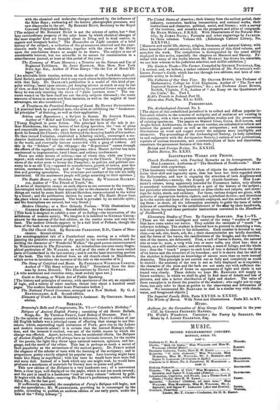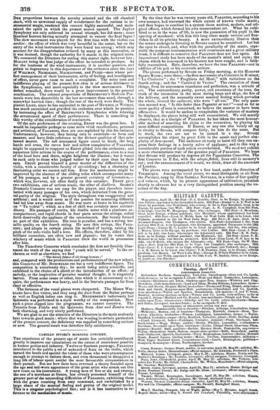MUSIC.
PART I.
Siufonia in C. No. 6 Monier.
Duetto, " Quis rut Immo," Miss Wtztaasis and Miss M
WILLIAMS (Stabat Mater)..... Rogow!.
Dramatic Concerto, Violin, Heft H. W. ERNsT Sports.
Quintetto, •• 0 cielo clemente," MSS WILLIAMS. Miss MARSHALL, Miss M. WILLIAMS. Mr. J. BEtnserr, and Signor F. LABLACHE c/i ('rociato in Egittn) MEYERSZEI. Coucerto iu (I Minor, No. a, Pianoforte. M. Moscum.ss Moscusum.
PAST If. Sinfonia Pastorale BEET1101117.
Terzetto, •• Fia grata at Ciel," Miss MARSHALL, Mr. .1 BENNSTP. and signor F. LABLACHL kFedelio) Barrsovatt. Introduction. Capriccio. sod Fivale. (au a Theme from 11 Pirata) Violin, Herr H. W. Eanwr Eatarr. Quintetto. •• Zemira I Children, all draw near." Miss WILLIAMS, MISR MARSHALL, Miss M. WILLIAMS. Mr. J. Eztorirr. and Signor F. LABIACHE (Azir and Zenara). SHOHR. Overture, Tamerlane warns. Leader, Mr. T. cams—Conductor, Sir H. R. BLIMP. Dttn proportions between the novelty selected and the old classical stock, with an unwonted supply of wonderment for the curious in in- stramental magic, rendered this concert highly successful, and main- tained the spirit in which the present season opened. The Jupiter Symphony not only achieved its annual triumph, but did more ; some fanatical hearers having actually attempted to encore the final fugue l The slow movement was played for the first time with the violins con sordini: the effect of which was very beautiful in the outset, but on the entry of the wind-instruments they were found too strong ; which may account for the disapprobation evinced by many at this innovation, as it was deemed, though the authority for it stands in the original score. We commend the Directors for setting this matter right, however late ; MozAar being the best judge of the effect he intended to produce. As for the leafiness of the wind-instruments, it is another question, and points to degeneracy in this department of the orchestra since the days of WILLiasx, NrcstoLson, MACKINTOSH, and Form—men whose per- fect management of their instruments, unity of feeling, and intelligence of effect, never gave room to such a complaint. The noisy tone and indifferent playing of the present first oboe is of serious detriment to the Symphonies, and more especially to the slow movements. This defect remedied, there would be a great improvement in the general combination. The colossal proportions of BEETHOVEN'S Sinfonia Pas- torale were less discernible in the last movement than usual, through a somewhat hurried time ; though the rest of the work went finely.The pianist LISZT, since he has succeeded to the post of HUMMEL at Weimar, has much astonished and gratified the orchestra over which he presides by increasing the effect of Besruoveres Symphonies while relaxing the accustomed speed of their performance. There is something in this worthy of the consideration of conductors. Of the solo performers of the evening, ERNST was the great lion. It would be impossible perhaps to raise more vivid recollections, personal and artistica, of PAGANINI, than are acccmplished by this his imitator. Unfortunately, however, they belong only to externals—to form and manner, and have little reference to the diviner qualities of that cele- brated master. The tall attenuated figure cased in black, the long hands and arms, the raven hair and sallow complexion of PAGasua, might be supposed to reappear as ERNST glided into the orchestra; and numerous little actions in the course of the performance, even to a toss of the head here and there, might heighten the illusion ; but it would be such only to those who judged rather by their eyes than by their ears. Eimer proved himself a great master of the difficulties of the violin, with a considerable faculty of astonishing; but a charming or fascinating artist we cannot call him. Even his mechanism might be improved by the absence of the sliding noise which accompanies many of his passages, and by a greater general certainty of intonation,— which was, however, not often faulty on this occasion. ERNST gave two exhibitions, one of serious music, the other of diablerie. SPOHR'S Dramatic Concerto was too easy for the player, and therefore inter- larded with many passages of his own, which detracted from the gene- ral purity of the original. The style throughout was exaggerated and artificial ; and it would seem as if the passion for mastering difficulty had led him away from music. He was more at home in his capriccio on " Tu vedrai" ; which as a feat of skill was certainly most extraor- dinary. His passages of tenths, his double notes with a pizzicato ac- companiment, and rapid chords in four parts across the strings, called forth deservedly the applause of the connoisseurs. But beauty formed no part of this exhibition. His tone is peculiar, and has a strong me- tallic quality on the fourth string. He uses thin strings, like PAGA- Nan ; and adopts in certain pieces his method of tuning, raising the pitch of the solo-violin half a note. His effects, therefore, aided by his brilliant execution, are often new and piquant ; but he wants that witchery of music which in PAGANDII drew the world in procession after him.
The Pianoforte Concerto which concluded the first act forcibly illus- trated the truth of the saying that "youth will be served." In the or- chestra as well as elsewhere, we find
The dreary Annus of all things human
and, compared with the productions and performances of the new school, this Concerto of Mr. MOSCHELES CM but a very indifferent figure. The composition is notoriously dry ; its merit being solely scientific, and exhibited in the choice of a chord or the introduction of an effect : of melody, or the inspiration of genuine musical thought, it is singularly barren. From some cause or other, into which it is unnecessary to in- quire, the performance was heavy, and in the bravura passages far from clear or effective.
The fortunes of the vocal pieces were chequered. The Misses WIL- LIAMS have fine voices, and they sang the duet from the Stabat perhaps as well as English ladies can sing it. MErsurwy.ses ludicrously bad Quintetto was performed. in a style worthy of the composition. How such a piece slipped into the programme, we cannot conceive. The Terzetto from Fidelio and the Quinteuo from Azor and Zemira were both charming, and very nicely performed.
We are glad to see the attention of the Directors in the main zealously bent towards good music where that was wanting in certain particulars of the present concert, the deficiency was supplied by something curious or new. The general result was therefore fully satisfactory.



























 Previous page
Previous page